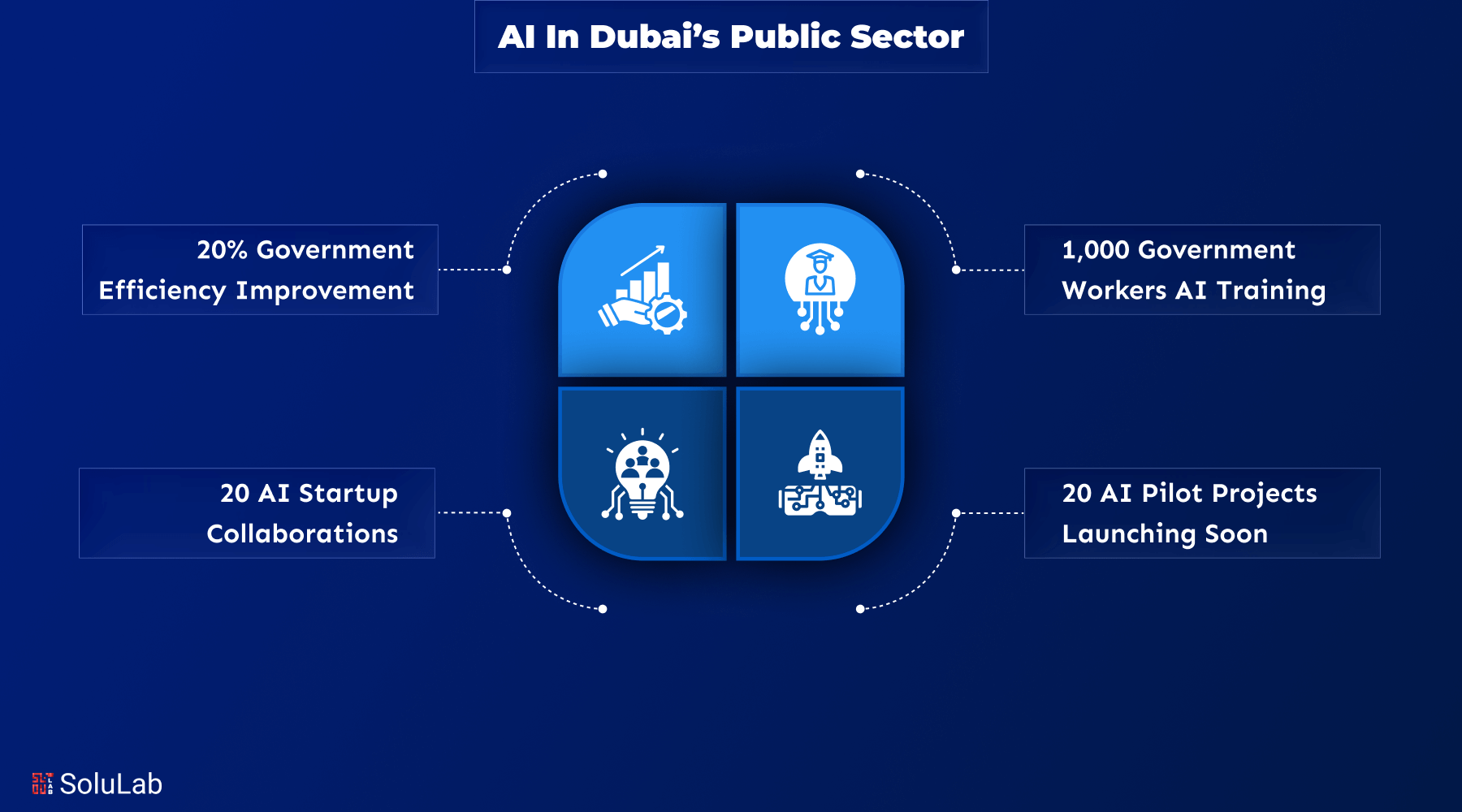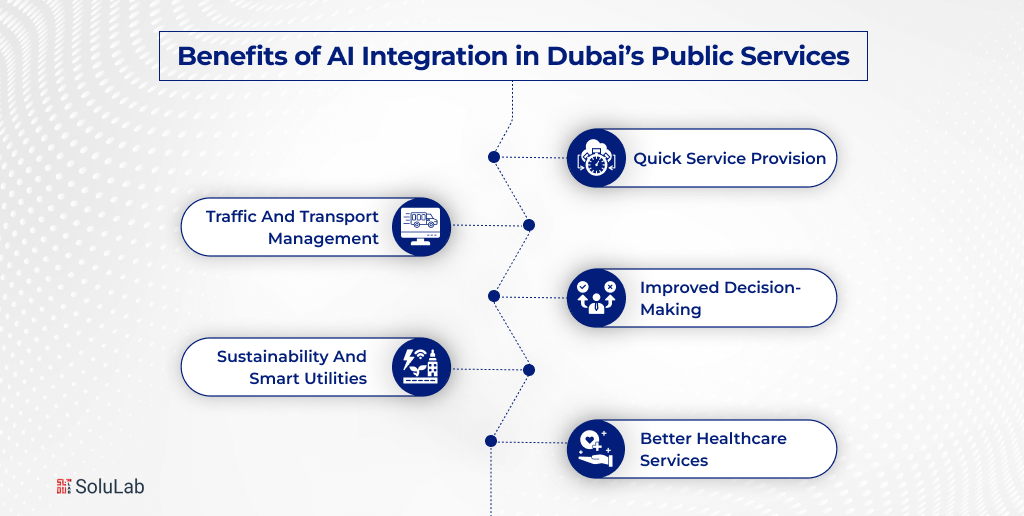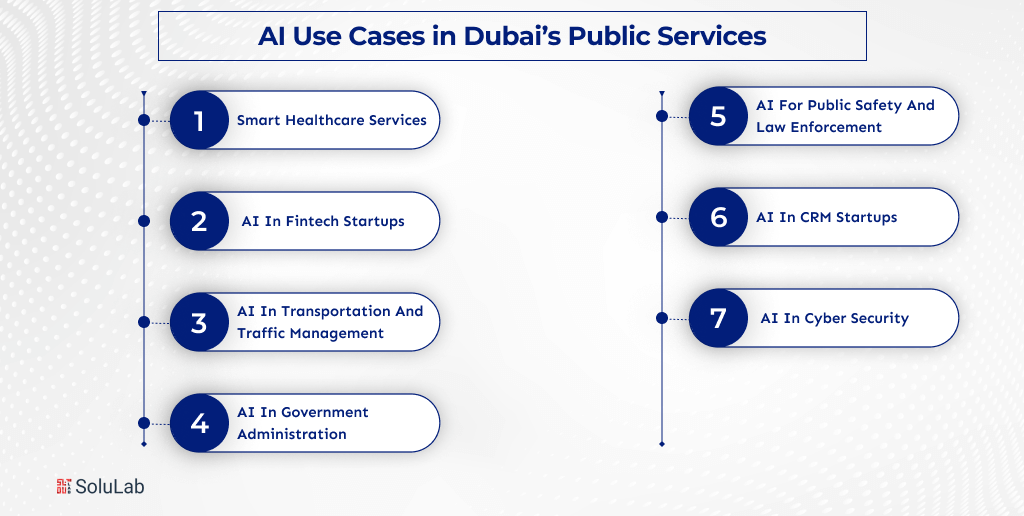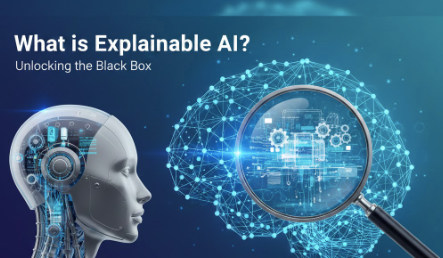
In recent years, Dubai has initiated strategic partnerships with tech giants and built new institutions to integrate AI in government and public sector operations to improve public services, governance, regulation, and planning.
By integrating AI across multiple sectors—healthcare, transportation, cybersecurity, education, and more. Dubai aims to become a global leader in AI by 2031.
According to ESG News, AI is projected to add an impressive AED 335 billion (USD 91.28 billion) to the UAE’s economy by 2031, further highlighting its transformative power.
In this blog, we’ll explore Dubai’s AI journey, the strategic partnerships behind it, and how these advancements are changing the future of governance, business, and everyday life.
Overview of AI in Dubai
Dubai has positioned itself as a global leader in artificial intelligence (AI) adoption, aiming to become the world’s smartest city. With the launch of the AI in UAE Strategy 2031, Dubai integrates AI across public services, from transportation and healthcare to governance and security.
Dubai’s AI integration includes:
- AI training for 1,000 government workers
- 20 AI pilot projects that will be launched soon
- Collaboration with 20 startups that specialize in AI
- Increasing government efficiency by 20%
To achieve these objectives, Digital Dubai is collaborating closely with regional and international partners. Projects like the AI Lab, which is a joint venture with IBM, offer a testing ground for real-world smart governance applications.
What Strategic Partnerships with Global Tech Giants are Being Formed?
Here are some Dubai AI transformation initiatives with global tech giants:
- Silver Lake’s Investment in G42: Silver Lake invested about US$800 million in G42, enhancing the UAE’s AI-cloud and enabling G42 to scale AI infrastructure, cloud services, and the public sector.
- Microsoft and G42 Partnership: Microsoft invested US$1.5 billion in G42, forming a collaboration to deploy over 200 AI-driven solutions across Abu Dhabi’s government services, automate all government processes, and build cloud infrastructure.
- MGX AI Infrastructure: MGX, a UAE-based AI investment firm, co-invested with Silver Lake (and others) to acquire Altera (chip company), strengthen data centre infrastructure (like Khazna Data Centers), and build AI infrastructure foundations.
- Space42 Initiative: Space42 (merger of Bayanat + Yahsat) has launched geospatial & Earth Observation (EO) partnerships (e.g., with EDGE’s FADA) to develop EO capabilities. Also, Map Africa MoU with Microsoft & Esri to improve mapping and public service planning.
- IHC’s AI-Powered Governance: To improve governance, risk insights, and strategic decision-making entirely within the United Arab Emirates, IHC launched “Aiden Insight 2.0,” an on-premise AI Board Observer. It was also introduced “SAIF,” an AI marketplace for developers worldwide.
Key Benefits of AI Integration in Dubai’s Public Services

Dubai is moving towards smarter, faster, and more citizen-friendly governance through the use of AI in public services. Here are the key benefits:
- Quick Service Provision: Using AI-based chatbots, virtual assistants, and robotic systems decreases the waiting time in government offices. Whether it is renewing licenses or paying bills, the residents can do things on the spot, which saves they time and energy.
- Improved Decision-Making: AI can assist the authorities in forecasting future demands and issues due to a large-scale examination of data. This will enable better policymaking, allocation of resources, and better long-term planning of the growth of Dubai.
- Better Healthcare Services: AI contributes to quicker illnesses, individualized care, and predictive health services. Hospitals also apply AI to care for patients remotely, decreasing hospital visits and maintaining timely care, and improving the overall health of the population.
- Traffic and Transport Management: AI can be used to monitor traffic movement, minimize traffic congestion, and enhance the efficiency of public transport. Intelligent cameras and predictive intelligence assistance are used to control accidents and leave the Dubai roads much safer and easier for commuters.
- Sustainability and Smart Utilities: AI is used to optimize the consumption of electricity and water based on the demand patterns. It helps Dubai bring in the vision of moving towards eco-friendliness by minimizing waste, boosting energy efficiency, and encouraging eco-friendly living around the city.
Top 7 AI Use Cases in Dubai’s Public Services

Dubai is using artificial intelligence across industries to build smarter, faster, and more efficient services. From healthcare to traffic management, here are some use cases in government and the public sector:
1. Smart Healthcare Services
AI is transforming Dubai’s healthcare sector with predictive diagnostics, virtual consultations, and smart hospital systems. These reduce patient wait times, improve diagnosis accuracy, and enable personalized treatment plans, ensuring citizens receive world-class healthcare with maximum efficiency.
2. AI in Fintech Startups
Dubai’s fintech startups leverage AI for fraud detection, credit scoring, and personalized financial planning. With AI-powered algorithms, financial institutions can process huge datasets securely and make smarter decisions, enhancing customer trust while boosting financial inclusion.
3. AI in Transportation and Traffic Management
AI is optimizing Dubai’s transport network with real-time traffic monitoring, smart parking solutions, and predictive route planning. These systems reduce congestion, enhance commuter safety, and ensure smoother traffic flow, supporting the city’s vision of becoming a global smart mobility hub.
4. AI in Government Administration
Dubai uses AI chatbots, predictive analytics, and automated systems for administrative tasks. From faster service delivery to better policy-making, AI helps reduce bureaucratic delays, ensuring citizens experience more transparent, efficient, and responsive governance.
5. AI for Public Safety and Law Enforcement
AI-powered surveillance, predictive policing, and facial recognition tools are strengthening public safety in Dubai. These technologies help law enforcement monitor threats, prevent crimes, and ensure faster response times, creating a safer and more secure city environment.
6. AI in CRM Startups
AI-driven CRM startups in Dubai are enabling businesses to offer hyper-personalized customer experiences. Through predictive analytics and chatbots, companies can anticipate client needs, automate interactions, and build stronger relationships, helping brands stay ahead in competitive markets.
7. AI in Cyber Security
With rising digital threats, AI is vital for detecting cyberattacks, analyzing anomalies, and securing sensitive data. Dubai integrates AI in cybersecurity systems to proactively defend critical infrastructure, protecting citizens and businesses from potential breaches.
Read Also: How Founders and Businesses Can Leverage Digital Asset Treasury in UAE?
Future of Artificial Intelligence in Dubai
Dubai has the Universal Blueprint for Artificial Intelligence, targeting an AED 100 billion per year contribution to its economy. Dubai’s Roads & Transport Authority has launched its AI Strategy 2030. It includes 81 projects & initiatives across mobility, licensing, traffic, etc., showing how integral AI will be in service delivery.
More training programmes for government officials & civil servants, AI labs in universities, incubators, and incentives for research. This ensures that AI-in-government doesn’t rely only on external vendors but builds capacity internal to the public sector.
Expect growth in AI applications in public health (disease prediction, early warning systems), occupational health & safety (monitoring, prevention), environmental monitoring (air quality, emissions), disaster response, etc.
Conclusion
Dubai is establishing a global standard in government and the public sector by developing partnerships across the world. The AI is improving efficiency, transparency, and citizen experience in healthcare and mobility, as well as governance and infrastructure.
Digital Quest, a travel business, partnered with SoluLab to develop an AI-powered chatbot using Generative AI. The chatbot enhanced customer engagement by offering real-time, personalized travel recommendations and hassle-free reservations. It also integrated user feedback and multi-language support, resulting in improved user experience and high ROI.
SoluLab, an AI development company, can help Dubai’s startups integrate AI. Whatever your industry is, we can help you add systems and reduce manual work. Get in touch with us today!
FAQs
1. What is the role of AI in the work of public services?
With AI development companies in the UAE, AI in public services enables automation, predictive analysis, and chatbots, as well as intelligent planning to enhance efficiency, cost reduction, and citizen experiences in the Dubai government.
2. What role does AI play in supporting the sustainability of the Dubai environment?
AI tracks the air quality, anticipates energy requirements, and controls water consumption and resources, enabling Dubai to align public services with the principles of sustainability.
3. Will AI take over human jobs in Dubai in the public sector?
Repetitive work will be automated by AI, but the main benefit will be to augment human work and allow employees to concentrate on strategic, creative, and citizen-centered work.
4. What is the role of AI in enhancing the smart city program in Dubai?
It is the AI that drives the IoT networks, AI-powered digital twins, and analytics to make Dubai’s infrastructure, energy, water, transport, and infrastructure operations more sustainable, considering the smart city vision of the city.






